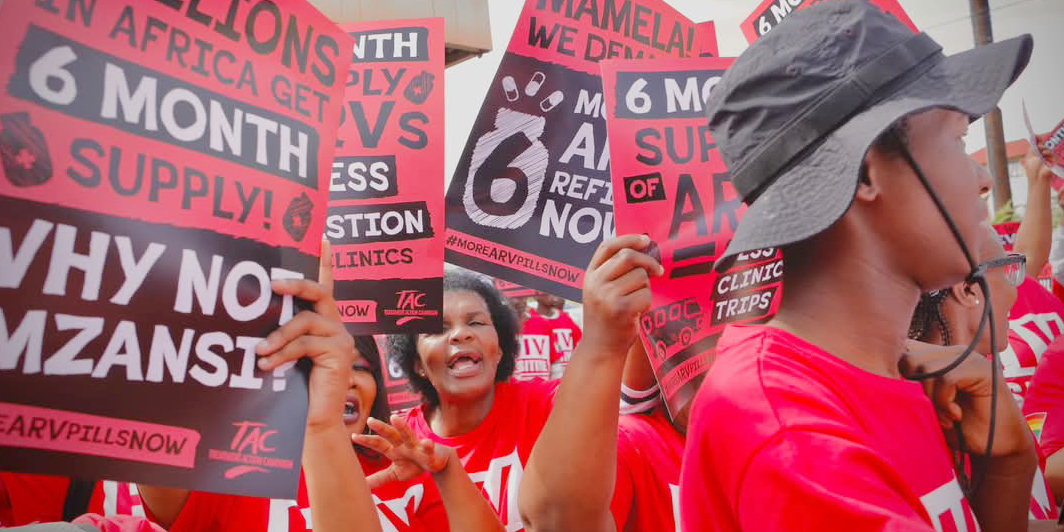More than 600 people marched to the Sisa Dukashe Stadium in Mdantsane in the Eastern Cape on Sunday — World Aids Day — to hand over a memorandum asking for people living with HIV to receive a six-month supply of antiretroviral (ARV) medicine at a time.
The memorandum was received by the chairperson of the South African National Aids Council, Deputy President Paul Mashatile, and the Minister of Health, Aaron Motsoaledi.
The march was organised by the Treatment Action Campaign (TAC), which believes this change will help many more people keep up with their treatment as some default because they can’t take days off every four, eight or 12 weeks to get their medicine.
The goal is for 95% of people living with HIV to know their HIV status, 95% of those who know their status to receive HIV treatment and 95% of people on treatment to achieve viral suppression.
The TAC said about two million people living with HIV were not on lifesaving ARVs, with some not knowing their status, others who know but have not started treatment, “and worryingly, many people have started treatment and then stopped”.
The organisation said people in other African countries received their ARVs at six-month intervals.
“More than six million people across Africa are already getting a six-month supply, with good retention and viral suppression outcomes, so why not here in South Africa where we have the biggest HIV burden in the world?” reads the memorandum.
At the World Aids Day event, activist Mluleki Zazini said his biggest concern was the withdrawal of funding from HIV and TB campaigns.
“We need to fix the issue of Aids councils that are under-resourced. We need to have civil society organisations that are fully resourced so they can respond to the needs,” said Zazini.
He also called for a zero-stigma day in honour of Prudence Mabele, who was one of the first people in the early 1990s to disclose their HIV status. Zazini said Mabele was recognised globally but not at home.
Need to increase screening
In his keynote address, Mashatile said that as of June, only 79% of people in SA who knew their status were on treatment, and only 93% of people on treatment were virally suppressed.
“Improvement across the 95-95-95 indicators was more pronounced in males compared to females. As a country, we need to further increase HIV screening, diagnosis and treatment initiation while maintaining treatment adherence to keep viral suppression rates high,” he said.
Mashatile called on workplaces, traditional leaders, community organisations, health centres, political parties, trade unions and student organisations to disseminate HIV-Aids information and encourage a culture of HIV testing, taking medicine and practising healthy living.
Mashatile acknowledged the intersection between HIV and gender-based violence.
HIV is prevalent among young people, especially adolescent girls and young women between the ages of 15 and 24, with 1,300 new cases a week in SA. The infection rate among boys and young men in the same age group, however, is almost three times less.
Mashatile noted that a variety of factors, including the biological makeup of women’s bodies and involvement in age-disparate relationships, contributed to this phenomenon.
“The Department of Health, in collaboration with stakeholders, including Pepfar, has released the new B-Wise App, a progressive web app for youth-friendly health services and information.
“The B-Wise App is an interactive digital platform that aims to enhance the accessibility of health services for adolescents and young adults, such as HIV prevention, mental health, family planning and contraceptive use, empowering them to make informed decisions about their sexual and reproductive health,” said Mashatile.
He said the SA National Aids Council Men’s Sector was leading the national men’s health campaign, Better Man 4 Tomorrow. “This campaign calls upon all adolescent males and adult men to seek health services and learn about their HIV status and general well-being,” said Mashatile.
The campaign will bring health services to places where men congregate, such as sporting events and traditional gatherings.
Mashatile acknowledged the challenges the health system faced, but ended his speech on an optimistic note, saying: “Working together, we can end Aids by the year 2030.” DM





